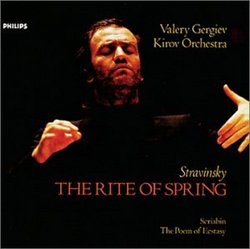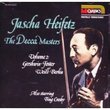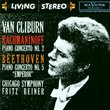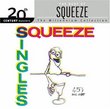| All Artists: Alexander Scriabin, Igor Stravinsky, Valery Gergiev, Kirov Orchestra Title: Igor Stravinsky: The Rite of Spring / Alexander Scriabin: The Poem of Ecstasy - Valery Gergiev / Kirov Orchestra Members Wishing: 2 Total Copies: 0 Label: Philips Original Release Date: 1/1/2001 Re-Release Date: 10/9/2001 Genre: Classical Styles: Ballets & Dances, Ballets, Historical Periods, Modern, 20th, & 21st Century, Symphonies Number of Discs: 1 SwapaCD Credits: 1 UPC: 028946803523 |
Search - Alexander Scriabin, Igor Stravinsky, Valery Gergiev :: Igor Stravinsky: The Rite of Spring / Alexander Scriabin: The Poem of Ecstasy - Valery Gergiev / Kirov Orchestra
 | Alexander Scriabin, Igor Stravinsky, Valery Gergiev Igor Stravinsky: The Rite of Spring / Alexander Scriabin: The Poem of Ecstasy - Valery Gergiev / Kirov Orchestra Genre: Classical
Gergiev's is a Rite of Spring with a difference. He stresses the primitive barbarism of Stravinsky's groundbreaking score--the strange wheezings of the winds, the wild yawps of the tubas, and the deep rumblings of the bass... more » |
Larger Image |
CD DetailsSynopsis
Amazon.com Gergiev's is a Rite of Spring with a difference. He stresses the primitive barbarism of Stravinsky's groundbreaking score--the strange wheezings of the winds, the wild yawps of the tubas, and the deep rumblings of the bass drum. It's a Rite that stands out at a time when so many internationalized western orchestras give the piece an overlay of sophisticated polish that can rob it of the shock factor that drove the audience at the Paris premiere to riot. There are also numerous personal touches that can be controversial, such as the pause before the final chord, which may bother some but which work in the context of the interpretation. Gergiev's Rite faces strong competition from recorded versions by Markevitch, Dorati, Monteux, and Stravinsky himself, but it's definitely among the top choices. The Scriabin's less compelling, though still fascinating. Gergiev's approach tends to sound sectional, as the overall line is subordinated to momentary thrills. --Dan Davis Similarly Requested CDs
|
CD ReviewsThe Raw Power of Nature T. Cheng | Diamond Bar, CA USA | 12/11/2003 (5 out of 5 stars) "This is the finest Rite I have ever heard. I have long listened to Robert Craft (LSO) recording, Stravinsky's own CBS recroding, and Igor Markevitch. These 3 have long been my favorites and I have heard at least a dozen other versions that didn't make the cut. Here we have a conductor who feels this score in his blood. This is an interpretation that reaches deep into the darkness of the soil and earth. It feels the roots of the trees and living things deep down. Tempi are slightly slower than normal (in no way sluggish) that gives a certain gravitas not found in, for example, Craft's otherwise fine recording (however, let me say the sheer shock value from the timapni in Craft's is something that I have never heard equalled). The cellos growl like no other, and there is a certain RAWNESS that is palpable. The opening Dance of the Adolescents sounds like a locomotive in it's deep resonance and power (as opposed to IS's own rec, which sounds like he is toning things down). The final Sacrifical Dance is special in that the drums are heard as distinct as in no other, also with a certain "tribal" primitivness that I have only heard in IS's own recording. Yet the recording is with great emotion, if that can be said of Stravinsky. Listen to the opening famous basson melody... played with a Romantic vibrato that was new to my ears. This is a once in a generation recording of a seminal work." A colorful, expansive interpretation R. Hutchinson | a world ruled by fossil fuels and fossil minds | 10/20/2001 (5 out of 5 stars) "Ah, Gergiev and the Kirov have finally recorded Stravinsky's "Rite"! This is a colorful, sprawling rendition, light and strong on woodwinds. It summons up images of Russian spring, flowering and bubbling. It reminds me of nothing so much as Debussy. This is not what I expected from the acclaimed Russian conductor, but the detail and nuance are superb. The contrast with the classic 1969 recording by Boulez and Cleveland is striking. Neither is more powerful or passionate, but they employ very different qualities of passion and power. Boulez evokes images of our bloody modern world as opposed to an agrarian past. His is a hard, dark, intense vision with structural focus and clarity, and strong narrative force. If I was forced to choose one, I'd go with Boulez, but the beauty is the variety of interpretations, as Stravinsky himself emphasized, and Gergiev's is excellent! Scriabin's "Poem of Ecstasy" makes a great pairing, highlighting the influence on Stravinsky of his formative milieu, and duplicating Gergiev's earlier pairing of Scriabin with Stravinsky's "Firebird."" Exiting, but flawed. Gowdie | New York | 07/19/2006 (3 out of 5 stars) "Valery Gergiev is indeed one of the best conductors around now. He has a charisma that makes any orchestra soar. That being said, despite the power and exitment involved in this performance of "The Rite of Spring" I'm afraid there are major flaws that have to be mentioned.
In the "Dance of the Earth" section, the percussionist is lost as his entrances with the Tam-tam are out of place with the rest of the orchestra. This is no small mistake, since the Tam-tam is supposed to be unison with the rest of the orchestra. How this error was not discovered before release is something I wont fully understand. I don't fully agree with Gergiev's general concept of having the quieter parts louder than normal. It takes a lot away from the building of tension in a section. But overall, it's an exiting performance. Alexander Scriabin's "The Poem of Ecstasy" fares well here. Passionate playing from the strings of the Kirov. But even here there's a major editing flaw. During the quiet last pages of the work, for some reason, a measure of the longing violins playing E into D# was accidentaly omited from this performance. This mistake is not too hard to make since it is a repitition of two other measures around it. I've made simular mistakes myself as a recording producer, but I've always corrected it by listening to the whole thing with a score prior to doing a final mix. It appears that this has not been done here. Despite these major flaws that clearly get in the way (at least for me), this is a distinctive version of these two great works. Valery Gergiev certanly makes his mark." |

 Track Listings (15) - Disc #1
Track Listings (15) - Disc #1






